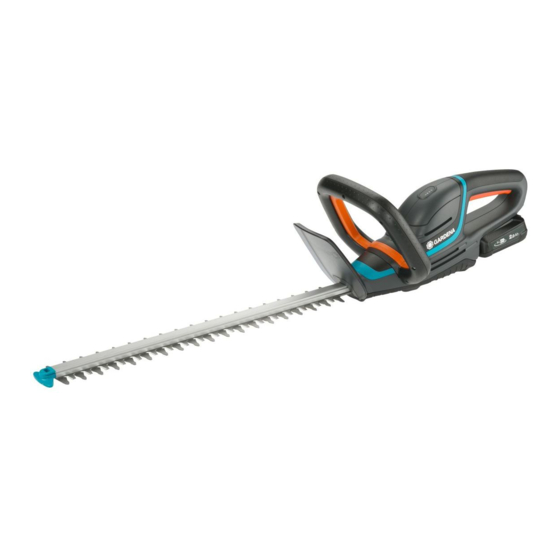Gardena ComfortCut 50/18V P4A Operatör El Kitabı - Sayfa 7
Düzeltici Gardena ComfortCut 50/18V P4A için çevrimiçi göz atın veya pdf Operatör El Kitabı indirin. Gardena ComfortCut 50/18V P4A 10 sayfaları. Battery hedge trimmer

v Do not clean the product with water or with a water jet
(in particular high-pressure water jet).
v Do not clean with chemicals including petrol or solvents.
Some can destroy critical plastic parts.
The airflow slots must always be clean.
1. Clean the hedge trimmer with a damp cloth.
2. Clean the airflow slots
(6)
with a soft brush (do not use a screwdriver).
3. Lubricate the blade with a low viscosity oil (e. g. GARDENA
Maintenance Oil Art. 2366).
Avoid contact with the plastic parts.
To clean the battery and the battery charger:
Make sure that the surface and the contacts of the battery and the battery
charger always are clean and dry before you connect the battery charger.
Do not use running water.
v Battery charger: Clean the contacts and the plastic parts with a soft
and dry cloth.
v Battery: Occasionally clean the ventilation slots and the terminals on
the battery using a soft brush that is clean and dry.
5. STORAGE
To put into storage:
The product must be stored away from children.
1. Slide the protective cover over the blade.
2. Remove the battery.
3. Charge the battery.
4. Clean the hedge trimmer, the battery and the battery charger
(see 4. MAINTENANCE).
5. Store the hedge trimmer, the battery and the battery charger in a dry,
enclosed and frost-free place.
Disposal:
(in accordance with RL2012/19/EC)
The product must not be disposed of to normal household
waste. It must be disposed of in line with local environmental
regulations.
IMPORTANT!
v Dispose of the product through or via your municipal recycling
collection centre.
Disposal of the battery:
The GARDENA battery contains lithium-ion cells that should not
be disposed of with normal household waste at the end of its life.
Li-ion
IMPORTANT!
v Dispose of the batteries through or via your municipal recycling
collection centre.
1. Discharge the lithium-ion cells completely (contact the GARDENA
Service).
2. Protect the contacts on the lithium-ion cells against short circuits.
3. Dispose of the lithium-ion cells properly.
6. TROUBLESHOOTING
DANGER! Risk of injury!
Cut injury when the product starts accidentally.
v Wait for the blade to stop, remove the battery and slide the
protective cover over the blade before you troubleshoot the
product.
Problem
Possible Cause
Hedge trimmer can no
Start lever is stuck.
longer be stopped
Hedge is not cleanly cut
Blade is blunt or damaged.
12
Problem
Hedge trimmer vibrates
severely
Hedge trimmer does not
start or stops.
LED
(L1)
green [ Fig. O4 ]
Hedge trimmer does not
start or stops.
Error-LED
red [ Fig. O4 ]
Hedge trimmer does not
start or stops.
Error-LED
red [ Fig. O4 ]
Hedge trimmer does not
start or stops.
Error-LED
illuminated [ Fig. O4 ]
Charging is not possible.
Battery charge indicator
is continuously illuminated
[ Fig. O3 ]
Battery charge indicator
is not illuminated [ Fig. O3 ]
7. TECHNICAL DATA
Battery Hedge Trimmer
Strokes
Length of blade
Tooth gap of blade
Weight (without Battery)
Sound pressure level L
Uncertainty k
Sound power level L
measured / guaranteed
Uncertainty k
Hand / arm vibration a
Uncertainty k
Measuring process complying with:
sure. The vibration emission value can vary during actual use of the electric power tool.
Remedy
System Battery
v Remove the battery and
loosen the start lever.
Battery voltage
v Let the blade replaced by the
Battery capacity
GARDENA Service.
Possible Cause
Blade is damaged.
Battery is empty.
is flashing
Battery temperature is outside
the permissible temperature
(Wp)
is illuminated
range.
There are drops of water or
moisture between the battery
contacts on the hedge trimmer.
Engine is blocked.
Product is defective.
(Wp)
is flashing
Battery is not put completely
into the battery holder.
(Wp)
is not
Battery is defective.
Product is defective.
The battery is not connected
(Lc)
(correctly).
Battery contacts are dirty.
Battery temperature is outside
the permissible charging
temperature range.
Battery is defective.
(Lc)
Mains plug of the charger is
not (correctly) plugged in.
Socket outlet, mains cable or
charger is defective.
NOTE: For any other malfunctions please contact the GARDENA service depart-
ment. Repairs must only be done by GARDENA service departments or specialist
dealers approved by GARDENA.
Unit
Value (Art. 14730)
1/min
2400
cm
50
mm
20
kg
2.6
84
1)
dB (A)
pA
3
pA
:
2)
WA
91 / 94
dB (A)
3
WA
1.9
1)
m/s
2
vhw
1.5
vhw
EN 62841-4-2
1)
NOTE: The stated vibration emission value has been measured according to
a standardised test procedure and can be used for comparison of one electric
power tool with another. It can also be used for preliminary evaluation of expo-
Unit
Value (Art. 14902)
PBA 18V 2.0Ah W-B
V (DC)
18
Ah
2.0
Remedy
v Switch off the product and
let the blade be replaced.
v Charge the battery.
v Wait until the battery tem-
perature is between
0 °C – + 45 °C again.
v Remove the water drops /
moisture with a dry cloth.
v Remove the obstacle.
Start again.
v Contact the GARDENA
Service.
v Put the battery completely
into the battery holder until
it audibly engages.
v Replace the battery.
v Contact the GARDENA
Service.
v Connect the battery to
charger correctly.
v Clean the battery contacts
(e. g. by connecting and
disconnecting the battery
several times. Replace the
battery if necessary.
v Wait until the battery tem-
perature is between
0 °C – + 45 °C again.
v Replace the battery.
v Insert the mains plug into the
mains socket (completely).
v Check the mains voltage.
Let the charger be checked
if necessary by an authorised
specialist dealer or the
GARDENA Service.
Value (Art. 14731)
2400
60
20
2.7
84
3
92 / 95
3
1.5
1.5
RL 2000/14/EC
2)
Value (Art. 14903)
PBA 18V 2.5Ah W-B
18
2.5
